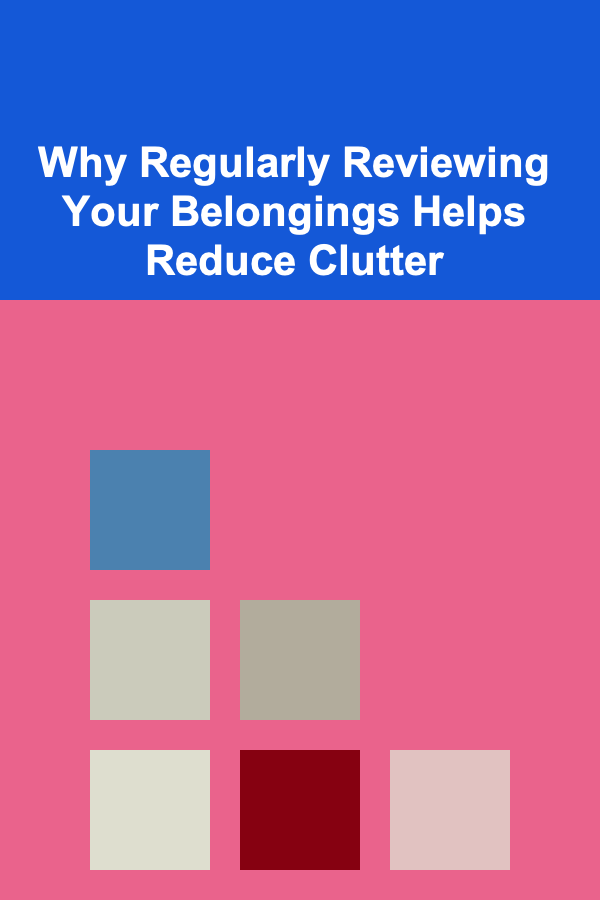
Why Regularly Reviewing Your Belongings Helps Reduce Clutter
ebook include PDF & Audio bundle (Micro Guide)
$12.99$10.99
Limited Time Offer! Order within the next:

In a fast-paced world where consumerism often drives our purchasing habits, clutter can easily accumulate in our homes and lives. Over time, we might find ourselves surrounded by items that no longer serve us or bring joy. This is where the practice of regularly reviewing belongings comes into play---a proactive approach to decluttering that not only creates physical space but also contributes to mental clarity, emotional well-being, and sustainable living. In this comprehensive guide, we will explore the importance of regularly reviewing your belongings, the psychological benefits it brings, practical strategies for effective decluttering, and tips for maintaining an organized environment.
Understanding Clutter
1. Definition of Clutter
Clutter refers to an accumulation of items that are disorganized, misplaced, or no longer needed. It can manifest in various forms---physical objects piled up in drawers, clothing stuffed in closets, or even digital files overwhelming our devices.
2. Types of Clutter
- Physical Clutter: Physical items such as clothes, books, gadgets, and furniture.
- Digital Clutter: Files, emails, applications, and data that accumulate on our devices.
- Emotional Clutter: Sentimental items or unresolved feelings associated with possessions that may occupy mental space.
3. The Impact of Clutter
Clutter can have adverse effects on our lives:
- Physical Space: A cluttered space can lead to chaos and disorganization, making it difficult to navigate and use effectively.
- Mental Health: Studies have shown that clutter can increase stress levels and contribute to feelings of anxiety and overwhelm.
- Time Consumption: Clutter requires time to manage; searching for lost items or cleaning around clutter takes away from more productive activities.
The Importance of Regularly Reviewing Your Belongings
1. Encourages Mindfulness
1.1 Increased Awareness of Possessions
Regularly reviewing belongings fosters mindfulness about what you own. It encourages you to consider how each item fits into your life and whether it still serves a purpose.
1.2 Intentional Living
By periodically assessing your items, you become more intentional about your consumption and lifestyle choices. This can lead to better decisions regarding future purchases.
2. Reduces Stress and Anxiety
2.1 Clarity Amid Chaos
A cluttered environment can be overwhelming. Regular review helps restore order, creating a calming atmosphere that reduces stress and promotes mental clarity.
2.2 Emotional Release
Letting go of items that no longer serve you can provide an emotional release. It allows you to focus on what truly matters in your life instead of being weighed down by unnecessary possessions.
3. Enhances Productivity
3.1 Improved Focus
An organized environment promotes better concentration and productivity. When your belongings are sorted and accessible, you can work more efficiently without distractions.
3.2 Easier Decision Making
With fewer items to choose from, decision-making becomes easier. Whether picking out an outfit or selecting tools for a project, a streamlined selection enhances efficiency.
4. Creates Space for New Experiences
4.1 Embracing Minimalism
Regularly reviewing and decluttering can lead to a more minimalist lifestyle. This means embracing experiences over material possessions, allowing you to focus on what truly enriches your life.
4.2 Opportunity for Growth
When you let go of the old, you make room for new opportunities, whether it's trying a new hobby, traveling, or engaging in meaningful relationships.
Practical Strategies for Reviewing Your Belongings
1. Set a Schedule
1.1 Create Regular Review Intervals
Establish a routine for reviewing your belongings. Consider seasonal reviews (e.g., spring cleaning), monthly check-ins, or annual assessments to keep clutter at bay.
1.2 Time Blocks
Allocate specific time blocks for the review process. Breaking it down into manageable sessions prevents it from feeling overwhelming.
2. Use the Four-Box Method
2.1 Preparation
Gather four boxes or bins labeled:
- Keep
- Donate
- Sell
- Trash
As you sort through your belongings, place each item into one of these boxes based on its condition and your desire to keep it.
3. Apply the One-Year Rule
3.1 Evaluate Usage
If you haven't used an item in the past year, consider whether it still serves a purpose in your life. This rule helps identify items that may be taking up unnecessary space.
3.2 Seasonal Considerations
For seasonal items (e.g., winter clothing), assess whether you genuinely need them or if they can be replaced with newer, functional alternatives.
4. Incorporate the Marie Kondo Method
4.1 Spark Joy Assessment
Adopt the "spark joy" principle made popular by tidying expert Marie Kondo. Hold each item and ask yourself if it sparks joy. If it doesn't, consider letting it go.
4.2 Gratitude Acknowledgment
Express gratitude for items you decide to part with. Acknowledging their role in your life can help ease the emotional attachment.
5. Tackle One Area at a Time
5.1 Focused Sessions
Instead of trying to tackle the entire house in one go, focus on one area at a time---such as a drawer, closet, or room. This makes the process less daunting and more manageable.
5.2 Category-Based Approach
Alternatively, sort by category (e.g., clothing, books, kitchenware) across multiple rooms. This allows you to see how much of a certain type of item you own.
Overcoming Common Challenges in Decluttering
1. Sentimental Attachments
1.1 Emotional Resistance
It's natural to feel attached to sentimental items. Acknowledge your feelings, but also recognize when an item is taking up valuable space without adding value to your life.
1.2 Memory Preservation Alternatives
Consider taking photos of sentimental items before letting them go. This way, you preserve the memory without requiring physical space.
2. Fear of Future Needs
2.1 Assess Realistic Needs
Evaluate whether you truly need certain items for potential future use. Ask yourself if you can rent or borrow items instead of keeping them indefinitely.
2.2 Focus on Necessity
Keep only those items that you genuinely use and need. Trust that you can acquire things again if necessary.
3. Time Constraints
3.1 Prioritize Small Sessions
If time is limited, opt for quick, focused sorting sessions rather than lengthy reviews. Even ten minutes a day can lead to significant progress.
3.2 Enlist Help
Involve family members or friends in the decluttering process. Having support can make it more enjoyable and efficient.
Benefits Beyond Physical Space
1. Psychological Well-Being
1.1 Boosted Confidence
Achieving a clutter-free space can enhance self-esteem and confidence. It provides a sense of accomplishment and control over your environment.
1.2 Reduced Anxiety Levels
Studies suggest that cleaner spaces contribute to lower anxiety levels. A tidy environment signals to your brain that everything is in order, promoting relaxation.
2. Improved Relationships
2.1 Shared Spaces
An organized living space fosters healthier relationships among household members. It reduces conflicts related to clutter and shared responsibilities.
2.2 Hosting Opportunities
With reduced clutter, your home becomes more inviting for guests. You'll feel more comfortable hosting gatherings and sharing your space.
3. Financial Benefits
3.1 Increased Financial Awareness
Regularly reviewing belongings fosters awareness of what you own. This can prevent unnecessary purchases and promote thoughtful spending.
3.2 Selling Unused Items
Through decluttering, you may discover valuable items that can be sold, providing extra income and reducing financial stress.
Maintaining a Clutter-Free Environment
1. Adopt a "One In, One Out" Rule
1.1 Balanced Acquisition
Implementing a system where you remove one item for every new item brought into your home helps maintain balance and prevents future clutter.
1.2 Mindful Shopping Habits
Before purchasing, evaluate whether the item is truly necessary. This cultivates a mindful shopping mentality.
2. Develop Daily Habits
2.1 Tidying Rituals
Incorporate quick daily or weekly tidying rituals to prevent clutter buildup. Spend a few minutes each day putting things back in their designated places.
2.2 Designate Drop Zones
Create specific areas for items that tend to accumulate clutter, like keys, mail, and bags. Assign drop zones to encourage organization.
3. Reassess Regularly
3.1 Periodic Reviews
Schedule periodic evaluations of your belongings, even after initial decluttering. Regular assessments prevent clutter from creeping back into your life.
3.2 Celebrate Progress
Acknowledge and celebrate the progress you've made in decluttering and organizing. This reinforces positive habits and encourages continued effort.
Conclusion
Regularly reviewing your belongings is not merely a chore; it is a transformative practice that can significantly impact your physical space, mental well-being, and overall quality of life. By adopting a proactive approach to decluttering, you create an environment that fosters clarity, creativity, and peace.
The journey toward a clutter-free existence requires dedication and consistency, but the rewards are profound. Embrace the process, apply the strategies outlined in this guide, and discover the freedom and fulfillment that come from living with intention and simplicity. Happy decluttering!
Other Products

How to Create a Content Strategy for Consistent YouTube Uploads
Read More
How to Create Your Own DIY Natural Cleaning Products on a Budget
Read More
How to Host a Cozy Winter Party with Hot Drinks and Snacks
Read More
How to Keep Kids Organized During Family Vacations
Read More
How to Organize Your Makeup Collection by Category
Read More